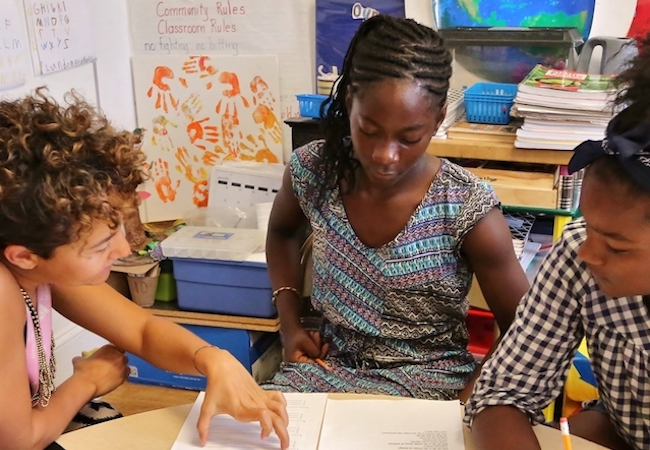Racial Empowerment Collaborative helps families confronting racism

Dr. Riana Anderson (left) works with students on emotional responses and comebacks to racism.
Children of color are subject to racist remarks. It’s a sad reality, and social scientists have found that even young children understand even subtle racism, both directed at them and in the news. Many parents struggle with how to prepare their children to react to such an encounter in a way that keeps them safe in the moment, and best maintains their dignity and self-respect.
Based in the Racial Empowerment Collaborative at the University of Pennsylvania Graduate School of Education, the Engaging, Managing, and Bonding through Race (EMBRace) program is a 5-week culturally-based therapeutic program that empowers African American youth (ages 10-14) and their parent(s) to confront racial trauma and stress together.
Dr. Riana Anderson, a Ford Foundation Postdoctoral Fellow, is a developer and director of the program. Her fellowship is with clinical psychologist Dr. Howard Stevenson, a renowned expert on racial literacy and racial trauma.
Speaking with WHYY’s Newsworks, Anderson explains how the program helps adolescents work through the emotional response:
Kids who are not prepared often bottle up frustration and anger, said Riana Anderson, developer and director of the program.
"You're going to internalize quite a bit, and think about all the things you did wrong ... what it is about me as a person? ... rather than this is what this person sees about a whole group of people," she said.
Part of helping kids process racist acts or prepare for them is an exercise families do in sessions — formulating comebacks.
"The racial comebacks are a way of saying "I know you are, but what am I?"' said Anderson.
Parents and adolescents start each week’s meeting by engaging in separate therapeutic sessions where they can voice their narrative about living as a Black person and the degree to which they have experienced stress with this identity. Families then come together for a session focused on enhancing messages about racial pride, bias preparation, rationales behind promoting distrust, and why not engaging in racial socialization practices may be detrimental to youth.
Follow EMBRace on Facebook: https://www.facebook.com/EMBRacePhilly/
And Twitter: https://twitter.com/embracephilly
To sign up for EMBRace: http://www.recastingrace.com/research/embrace

